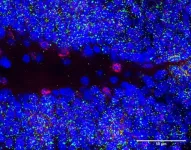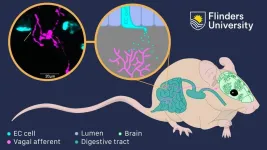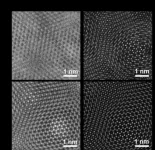(Press-News.org) Researchers at the Centre for Genomic Regulation (CRG) reveal that the Snhg11 gene is critical for the function and formation of neurons in the hippocampus. Experiments with mice and human tissues revealed the gene is less active in brains with Down syndrome, potentially contributing to the memory deficits observed in people living with the condition. The findings are published today in the journal Molecular Psychiatry.
Traditionally, much of the focus in genomics has been on protein-coding genes, which in humans constitutes around just 2% of the entire genome. The rest is "dark matter", including vast stretches of non-coding DNA sequences that do not produce proteins but are increasingly recognized for their roles in regulating gene activity, influencing genetic stability, and contributing to complex traits and diseases.
Snhg11 is one gene found in the ‘dark matter’. It is a long non-coding RNA, a special type of RNA molecule that is transcribed from DNA but does not encode for a protein. Non-coding RNAs are important regulators of normal biological processes, and their abnormal expression has been previously linked to the development of human diseases, such as cancer. The study is the first evidence that a non-coding RNA plays a critical role in the pathogenesis of Down syndrome.
Down syndrome is a genetic disorder caused by the presence of an extra copy of chromosome 21, also known as trisomy 21. It's the most common genetic cause of intellectual disability, estimated to affect five million people globally. People with Down syndrome have memory and learning problems, issues previously linked to abnormalities in the hippocampus, a part of the brain involved in learning and memory formation.
“The gene is particularly active in the dentate gyrus, a part of the hippocampus crucial for learning and memory and one of the few brain regions where new neurons are continuously created throughout life. We found that abnormally expressed Snhg11 results in reduced neurogenesis and altered plasticity, which plays a direct role in learning and memory, thus indicating a key role in the pathophysiology of intellectual disability,” says Dr. César Sierra, first author of the paper.
The authors studied the hippocampus in mouse models which have a genetic makeup similar to Down syndrome in humans. The hippocampus has many different cell types, and the study aimed to understand how the presence of an extra chromosome 21 affects these cells.
The researchers isolated nuclei from the brain cells and used a technique called single nucleus RNA sequencing to see which genes are active in each cell. One of the most striking findings were in cells of the dentate gyrus, where the researchers detected an important reduction of the expression of Snhg11. The researchers also found lower levels of Snhg11 in the same types of tissues from human postmortem brains with trisomy 21, indicating the relevance for the human cases.
To understand the effects of the reduced Snhg11 expression on cognition and brain function, the researchers then experimentally reduced the activity of the gene in the brains of healthy mice. They found that low levels of Snhg11 were sufficient to reduce synaptic plasticity, which is the ability for neuronal connections to strengthen or weaken over time. Synaptic plasticity is crucial for learning and memory. It also reduced the mouse’s ability to create new neurons.
To understand the real-world impact of their findings, the researchers also conducted various behaviour tests with mice. These experiments confirmed that low levels of Snhg11 led to similar memory and learning problems as seen in Down syndrome, suggesting the gene regulates brain function.
Snhg11 has previously been linked to cell proliferation in different types of cancer. The researchers plan on carrying out further research to discover the exact mechanisms of action involved, information that could open potential avenues for new therapeutic interventions. They will also explore whether other genes involving long non-coding RNAs, many which are yet to be discovered, might also contribute to intellectual disabilities.
“There are many interventions to help people with Down syndrome live independently, but only few are pharmacological. Studies like this help lay the foundations to find strategies that can help improve memory, attention and language functions, or prevent cognitive decline associated with ageing,” says Dr. Mara Dierssen, co-author of the paper and Group Leader of the Cellular & Systems Neurobiology lab at the Centre for Genomic Regulation.
END
Learning and memory problems in down syndrome linked to alterations in genome's ‘dark matter’
Lower activity of the Snhg11 gene in brains with three copies of chromosome 21 could underlie intellectual disability
2024-02-27
ELSE PRESS RELEASES FROM THIS DATE:
Race, racism, and covid-19 in the US: lessons not learn
2024-02-27
In The BMJ today, Keisha Bentley-Edwards at Duke University, North Carolina, and colleagues argue that systemic racism and economic inequality are at the root of disparity in covid-19 outcomes and suggest how to distribute resources more equitably.
The article is part of a series that highlights the lessons that can be learned from the US’s covid-19 experience and the actions that are needed to prevent the loss of another million citizens in the next pandemic and improve and protect population health.
"Rather than waiting for the next pandemic to address systemic failures, the ...
Low-Temperature Plasma used to remove E. coli from hydroponically grown crops
2024-02-27
A group led by researchers at Nagoya University and Meijo University in Japan has developed a disinfection technology that uses low-temperature plasma generated by electricity to cultivate environmentally friendly hydroponically grown crops. This innovative technology sterilizes the crops, promoting plant growth without the use of chemical fertilizers. Their findings appeared in Environmental Technology & Innovations.
In hydroponic agriculture, farmers cultivate plants by providing their roots with a nutrient solution. However, the nutrient solution can become infected with pathogenic E. coli strains, contaminating the crop and leading to foodborne illnesses.
To avoid ...
UK cancer treatment falls behind other countries
2024-02-27
Two major studies part-funded by Cancer Research UK reveal that the use of chemotherapy and radiotherapy in the UK has lagged behind comparable countries in the past decade
Patients faced longer waits to begin key cancer treatment, which could be impacting people’s chances of survival in the UK
With an upcoming UK general election, Cancer Research UK is calling on political leaders to step up and ensure patients get the level of care that they deserve
People in the UK were treated with chemotherapy ...
Gut-brain communication turned on its axis
2024-02-27
The mechanisms by which antidepressants and other emotion-focused medications work could be reconsidered due to an important new breakthrough in the understanding of how the gut communicates with the brain.
New research led by Flinders University has uncovered major developments in understanding how the gut communicates with the brain, which could have a profound impact on the make-up and use of medications such as antidepressants.
“The gut-brain axis consists of complex bidirectional neural communication pathway between the brain and the gut, which links emotional and cognitive ...
NSF and DOE establish a Research Coordination Network dedicated to enhancing privacy research
2024-02-27
In response to the rapidly evolving landscape of data collection and analysis driven by advances in artificial intelligence, the U.S. National Science Foundation (NSF) and the U.S. Department of Energy (DOE) have established a Research Coordination Network (RCN) dedicated to advancing privacy research and the development, deployment and scaling of privacy enhancing technologies (PETs). Fulfilling a mandate from the "Executive Order on the Safe, Secure, and Trustworthy Development and Use of Artificial Intelligence," the initiative advances the recommendations in the National Strategy to Advance ...
Want to encourage allyship? Highlight its appreciation, research shows
2024-02-27
Allyship — the practice of relatively advantaged group members acting with the intention to support, advocate and improve circumstances for relatively disadvantaged groups — is critical to promoting more inclusive and equitable organizations.
Not only are advantaged group members typically received more favorably within an organization than disadvantaged group members would be when they speak out against injustice, their allyship can improve disadvantaged group members’ psychological experience in the organization. For instance, men are more likely to believe other men, compared with women, when they confront sexism. And Black Americans report higher levels of self-esteem ...
UM School of Medicine awarded $3.5 million in federal funding to expand medical countermeasures program
2024-02-26
University of Maryland School of Medicine (UMSOM) Dean Mark T. Gladwin, MD, announced today that UMSOM faculty scientists have been selected as key contractors by the Biomedical Advanced Research and Development Authority (BARDA), for the federal agency’s Radiation Nuclear Animal Model Development program. The $3.5 million award that Erika Davies, PhD, Assistant Professor of Radiation Oncology, received to develop Acute Radiation Syndrome Animal Models, has a $16 million potential total. The Division of Translational Radiation Sciences (DTRS), within the Department of Radiation Oncology, will support this project.
Dr. Davies and her colleagues ...
Reimagining electron microscopy: Bringing high-end resolution to lower-cost microscopes
2024-02-26
Researchers at the University of Illinois at Urbana-Champaign have shown for the first time that expensive aberration-corrected microscopes are no longer required to achieve record-breaking microscopic resolution.
The field of microscopy is in the middle of a great revolution. Since the 1800s and the invention of the compound light microscope, there have only been a few major jumps in resolution to see different length scales: from bacteria and cells, to viruses and proteins, and even down to single atoms. Generally, ...
ACP recommends ways to better meet the health care and social needs of unhoused populations
2024-02-26
@Annalsofim
Below please find summaries of new articles that will be published in the next issue of Annals of Internal Medicine. The summaries are not intended to substitute for the full articles as a source of information. This information is under strict embargo and by taking it into possession, media representatives are committing to the terms of the embargo not only on their own behalf, but also on behalf of the organization they represent.
----------------------------
1. ACP Recommends Ways to Better Meet the Health Care ...
University of Technology Sydney chooses Figshare to drive the discoverability of non-traditional research outputs
2024-02-26
Figshare, a leading provider of institutional repository infrastructure that supports open research, is pleased to announce that the University of Technology Sydney (UTS) has chosen Figshare to support them in sharing, showcasing and managing their research reports and non-traditional research outputs.
UTS – Australia’s leading technology university – will use its Figshare repository and its integration with the Australian Research Data Commons Datacite DOI minting service to drive the discoverability and increase the impact of their research reports and non-traditional research outputs, ...
LAST 30 PRESS RELEASES:
Science reveals why you can’t resist a snack – even when you’re full
Kidney cancer study finds belzutifan plus pembrolizumab post-surgery helps patients at high risk for relapse stay cancer-free longer
Alkali cation effects in electrochemical carbon dioxide reduction
Test platforms for charging wireless cars now fit on a bench
$3 million NIH grant funds national study of Medicare Advantage’s benefit expansion into social supports
Amplified Sciences achieves CAP accreditation for cutting-edge diagnostic lab
Fred Hutch announces 12 recipients of the annual Harold M. Weintraub Graduate Student Award
Native forest litter helps rebuild soil life in post-mining landscapes
Mountain soils in arid regions may emit more greenhouse gas as climate shifts, new study finds
Pairing biochar with other soil amendments could unlock stronger gains in soil health
Why do we get a skip in our step when we’re happy? Thank dopamine
UC Irvine scientists uncover cellular mechanism behind muscle repair
Platform to map living brain noninvasively takes next big step
Stress-testing the Cascadia Subduction Zone reveals variability that could impact how earthquakes spread
We may be underestimating the true carbon cost of northern wildfires
Blood test predicts which bladder cancer patients may safely skip surgery
Kennesaw State's Vijay Anand honored as National Academy of Inventors Senior Member
Recovery from whaling reveals the role of age in Humpback reproduction
Can the canny tick help prevent disease like MS and cancer?
Newcomer children show lower rates of emergency department use for non‑urgent conditions, study finds
Cognitive and neuropsychiatric function in former American football players
From trash to climate tech: rubber gloves find new life as carbon capturers materials
A step towards needed treatments for hantaviruses in new molecular map
Boys are more motivated, while girls are more compassionate?
Study identifies opposing roles for IL6 and IL6R in long-term mortality
AI accurately spots medical disorder from privacy-conscious hand images
Transient Pauli blocking for broadband ultrafast optical switching
Political polarization can spur CO2 emissions, stymie climate action
Researchers develop new strategy for improving inverted perovskite solar cells
Yes! The role of YAP and CTGF as potential therapeutic targets for preventing severe liver disease
[Press-News.org] Learning and memory problems in down syndrome linked to alterations in genome's ‘dark matter’Lower activity of the Snhg11 gene in brains with three copies of chromosome 21 could underlie intellectual disability




